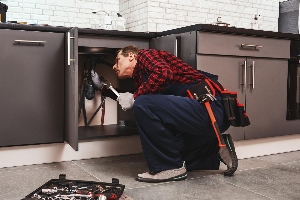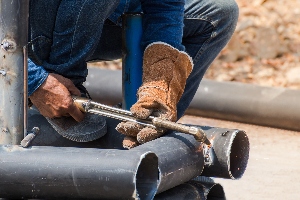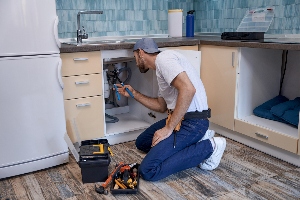Maintaining clean pipes is crucial for the optimal functioning of your plumbing system. Different materials used in pipe construction require specific approaches to cleaning to ensure longevity and performance. Pipes can be made from materials like PVC, copper, cast iron, and galvanized steel, each with distinct characteristics that dictate the suitable cleaning methods. Knowing the right techniques for each pipe type prevents damage and ensures your plumbing remains in good working order.
When dealing with PVC pipes, you should avoid using chemical cleaners that can soften the plastic and lead to future leaks. Instead, opt for mechanical methods such as augers or plungers. On the other hand, metal pipes like copper, cast iron, and galvanized steel can handle certain chemical cleaners but are prone to corrosion; thus, a careful balance must be maintained to clean effectively without causing harm.
Understanding the different reactions of these pipe materials to various cleaning agents will save you from costly repairs and ensure efficient water flow. Regularly scheduled cleaning can prevent build-ups and blockages, but knowing how to handle these different types of pipes can make all the difference if you encounter a sudden problem. It's always advantageous to have insight into the best practices for pipe maintenance tailored to the specific materials used in your home's plumbing infrastructure.
Fundamentals of Drain Cleaning
When you approach drain cleaning, it's important to first identify the type of pipes you have. This determines the methods and products you may use. Common pipe materials include PVC, copper, galvanized steel, and cast iron.
Know Your Pipes:
- PVC: Non-corrosive and relatively soft.
- Copper: Prone to corrosion from certain chemicals.
- Galvanized Steel: Can rust and corrode over time.
- Cast Iron: Durable but can deteriorate if not maintained properly.
After identifying your pipes, familiarize yourself with the drain layout. This includes understanding the trap, which is the curved section that prevents sewer gases from entering the home, and the main line that connects to the sewer or septic system.
Use the Right Tools:
- Plunger: Ideal for minor clogs.
- Drain Snake: For more stubborn blockages.
- Hydro Jetting: A high-pressure water method used by professionals.
Be cautious with chemical cleaners, as they can damage certain pipe materials. Instead, opt for natural solutions like a mix of vinegar and baking soda, followed by hot water.
Regular Maintenance Tips:
- Regularly flush drains with hot water.
- Install hair and debris catchers in showers and sinks.
- Avoid disposing of grease, coffee grounds, and non-food items down the drain.
For heavy blockages or recurring problems, contact a professional. They have the expertise and equipment to safely and effectively clean your drains without damaging the pipes. Remember, preventive maintenance is key to keeping your drains free-flowing.
Considerations for Pipe Material
When cleaning your pipes, the material they are made of is crucial in determining the appropriate cleaning method. Each material has its own strengths and vulnerabilities.
Copper:
- Pros: Resistant to corrosion, long-lasting.
- Caution: Abrasive materials can damage the surface.
PVC (Polyvinyl Chloride):
- Pros: Affordable, easy to install.
- Caution: Sensitive to heat and certain chemicals that can cause it to soften or warp.
ABS (Acrylonitrile Butadiene Styrene):
- Pros: Toughness and impact resistance.
- Caution: Avoid using harsh chemicals which can degrade the pipe.
Cast Iron:
- Pros: Durability, versatility.
- Caution: Susceptible to rust, requiring regular maintenance.
PEX (Cross-Linked Polyethylene):
- Pros: Flexible, resistant to scale and chlorine.
- Caution: Vulnerable to UV light and should not be exposed to sunlight before installation.
When choosing a drain cleaner, consider the following:
- Chemical Cleaners: Be wary as some can damage specific types of pipes. Always read the label carefully and follow manufacturer recommendations.
- Mechanical Methods: Such as drain snakes can be used across various materials but require careful handling to prevent pipe damage.
- Natural Solutions: Common home remedies like hot water, baking soda, and vinegar can be safe for most types of material, but effectiveness varies.
Regular maintenance can prevent clogs and reduce the need for aggressive cleaning methods that may risk damaging your pipes. If unsure, consult a professional to avoid inadvertently causing harm to your pipework.
Drain Cleaning Techniques for PVC Pipes
When cleaning PVC pipes, you need to use gentle methods to prevent damage. PVC, or Polyvinyl Chloride, is durable yet can be affected by harsh chemicals and high temperatures.
- Hot Water Flushing: Periodically flush your pipes with hot water, not boiling, to alleviate buildup. Do this weekly to maintain clear pipes.
- Baking Soda and Vinegar: A natural alternative to chemical cleaners:
some text- Pour a cup of baking soda down the drain.
- Follow with a cup of vinegar.
- Wait for the fizzing to reduce, then flush with warm water.
- Plunger: Utilize a plunger for tough clogs. Ensure you have a tight seal around the drain opening and use a consistent pumping motion.
- Drain Snake: For deeper clogs, you can use a hand-crank drain snake. Insert the tool carefully to avoid scratching the PVC interior.
- Enzymatic Cleaners: These break down organic materials without harming your pipes.
Technique
Usage Tip
Hot Water Flushing
Use weekly as a preventive measure.
Baking Soda and Vinegar
Rinse with warm water after fizzing stops.
Plunger
Check for a tight seal for effective plunging.
Drain Snake
Turn gently to prevent pipe damage.
Enzymatic Cleaners
Follow the manufacturer’s instructions closely.
Never use harsh chemical drain cleaners as these can degrade PVC pipes over time. If you are unsure about a method, seek professional advice.
Drain Cleaning Strategies for Copper Pipes
When dealing with copper pipes, it's crucial to avoid abrasive and chemical-heavy solutions as they can cause corrosion. Instead, focus on gentle, pH-neutral cleaners. Your go-to strategy should involve a plunger for immediate clogs, and a regular schedule for flushing the pipes with hot water.
Manual Unclogging:
- Use a plunger to shift simple blockages.
- Try a plumber's snake for deeper clogs but operate gently to prevent scraping the inner lining of the pipes.
Natural Solutions:
- Hot Water: Periodically flush drains with boiling water to dissolve fatty residues.
- Baking Soda and Vinegar: This combination can help to break down clogs. Pour ½ cup of baking soda followed by ½ cup of white vinegar. Wait an hour and rinse with hot water.
Preventive Maintenance:
- Install strainers to catch debris.
- Regularly remove and clean pop-up stoppers in sinks.
- Consider a monthly hot water flush as a preventive measure.
Professional Assistance:
- If the clog persists, contact a professional. They can employ techniques like hydro-jetting that are safe for copper pipes.
Remember, if you are ever uncertain about a method, especially when dealing with severe blockages or if you suspect damage to your pipes, professional plumbers are your best resource for maintaining the integrity of your copper plumbing.
Maintenance Tips for Cast Iron Drainage Pipes
Cast iron pipes have a long lifespan, but they require proper maintenance. Follow these guidelines to keep your cast iron drainage pipes in good condition:
- Regular Inspection: Check your pipes annually for any signs of corrosion or damage. Look for discoloration, flaking, or rust. Early detection of these signs can prevent major repairs.
- Gentle Cleaning: Use a plumber's snake to remove clogs. Avoid chemical cleaners as they can accelerate corrosion. For minor clogs, a mixture of hot water and mild soap can be effective.
- Prevent Clogs: Install strainers in sinks and showers to catch debris. Be careful with what goes down the drain; avoid flushing down grease, hair, or other substances that can cause buildup.
- Professional Assistance: If you detect significant wear or damage, seek professional help. Plumbers experienced with cast iron can provide specialized care.
- Use Non-Abrasive Materials: When doing any manual cleaning, use tools and cleaning agents that are non-abrasive to avoid scratching or damaging the interior lining of the pipes.
- Corrosion Protection: Ensure your pipes are not exposed to excessive humidity, which can accelerate rusting. Insulate pipes if necessary in areas with high moisture levels.
By implementing these maintenance tips, you can extend the life of your cast iron drainage pipes and ensure a well-functioning drainage system in your home.
Approaches for Cleaning Galvanized Steel Pipes
When dealing with galvanized steel pipes, it's essential to use non-corrosive cleaning methods to maintain the integrity of the zinc coating that protects the pipes from rust and corrosion. Below are suitable techniques for cleaning your galvanized steel pipes effectively.
- Mechanical Cleaning:
some text- Plumbing Snake: Use a manual or electric plumbing snake to dislodge and clear blockages within your pipes. Insert the snake into the pipe and turn it to break up clogs.
- High-pressure Water Jetting: Employ a high-pressure water jetter to remove debris and buildup by ejecting water at high pressures into the pipes.
- Chemical Cleaners:
some text- Be cautious with chemical cleaners as harsh chemicals can damage galvanized pipes. Opt for mild, enzyme-based cleaners that break down organic matter without harming the pipe's protective layer. Always follow the manufacturer’s instructions for use.
- Maintenance Tips:
some text- Hot Water Flushing: Regularly flush your pipes with hot water to help dissolve and remove oily substances and soap accumulations.
- Strainers and Filters: Install strainers in drains to catch debris before it enters your pipes, reducing the likelihood of clogs.
Remember to handle galvanized pipes gently to avoid damaging the zinc coating. For stubborn clogs or uncertain situations, consider consulting a professional plumber to ensure the best care for your plumbing system.
Solutions for Cleaning ABS Pipes
When handling ABS (acrylonitrile butadiene styrene) pipes, you should prioritize non-abrasive methods to maintain their integrity. Here are steps and tips for effectively cleaning your ABS pipes:
1. Regular Flushing:
- To prevent buildup, flush your pipes with hot water weekly.
- Do not use boiling water as extreme temperatures can damage ABS pipes.
2. Baking Soda and Vinegar Treatment:
- Pour 1 cup of baking soda down the drain, followed by 1 cup of white vinegar.
- Wait for 15 minutes and then rinse with hot water.
3. Enzymatic Cleaners:
- Opt for a non-corrosive enzymatic cleaner suitable for ABS pipes.
- Follow the manufacturer's directions for use.
4. Drain Snakes and Augers:
- Use a plastic drain snake to dislodge clogs without scratching the pipe's interior.
- Avoid using metal snakes which can damage the pipe.
5. Professional Assistance:
- If the clog persists, contact a professional plumber.
- Ensure they are aware of your pipe material to prevent the use of damaging equipment.
Maintenance Tips:
- Regularly clean sink stoppers and drain strainers to prevent debris from entering the pipes.
- Avoid chemical drain cleaners that can compromise the ABS piping material.
By employing these methods, you can keep your ABS pipes clean and functioning properly without causing harm to the pipe material.
Preventive Measures for Various Pipe Materials
When maintaining your pipes, it's essential to consider the material they are made of. Customizing your preventive measures helps extend the lifespan of the plumbing system and prevents clogs and corrosion. Here are some guidelines tailored to common pipe materials:
PVC Pipes:
- Avoid Harsh Chemicals: Steer clear of chemical drain cleaners that can soften or damage PVC.
- Regular Inspection: Check for any visible signs of damage or discoloration which may indicate a weakness.
Copper Pipes:
- Water pH: Ensure your water's pH level is neither too acidic nor too alkaline to avoid corrosion.
- Gentle Cleaning Agents: Use mild, non-corrosive cleaners for blockages.
Cast Iron Pipes:
- Rust Prevention: Keep the pipes dry; moisture can contribute to rust, so fix leaks promptly.
- Reduce Pressure: Prevent internal corrosion by avoiding high-pressure water jets during cleaning.
Galvanized Steel Pipes:
- Avoid Corrosives: Just like copper, protect against corrosive substances by checking water pH and using gentler cleaners.
- Soft Water: Hard water can speed up the corrosion process, consider a water softener if needed.
Clay Pipes:
- Root Maintenance: Regularly remove tree roots that may infiltrate and block the drains.
- Non-Abbrasive Tools: Use tools that won't crack or break the clay during cleaning.
PEX Pipes:
- Heat Protection: Protect from high temperatures which can warp the material.
- Regular Maintenance: Conduct periodic inspections to catch any issues early on.
For all materials, it's advisable to:
- Regular Flushes: Use hot water to flush your drains weekly to help clear away buildup and prevent blockages.
- Dispose of Grease Properly: Never pour grease down the drain; it solidifies and can lead to clogs irrespective of pipe material.
- Invest in Strainers: Use sink strainers to catch debris and prevent it from going down the drain.
Safety Guidelines for Drain Cleaning
When cleaning drains, whether in a residential or commercial setting, it's crucial to prioritize safety. Adhering to the following guidelines can help ensure that you complete the task effectively while minimizing risks.
- Personal Protective Equipment (PPE):
some text- Gloves: Wear heavy-duty gloves to protect your hands from chemicals and sharp objects.
- Goggles: Use safety goggles to prevent splashback from drain cleaners or debris.
- Clothing: Don long sleeves and pants to shield your skin from irritants.
- Chemical Safety:
some text- Read labels: Always read and follow the instructions on drain cleaning products.
- Ventilation: Ensure the area is well-ventilated to avoid inhaling fumes.
- Mixing: Never mix different chemicals. Combining them can release dangerous gases.
- Tool Use:
some text- Manual Snake: When using a manual drain snake, keep a firm grip and turn steadily to avoid the tool slipping or damaging the pipes.
- Plunger: Use a plunger with a flange for toilets, and a standard plunger for sinks and tubs to create proper suction.
- Electrical Safety:
some text- Power Tools: If using electric drain cleaning equipment, ensure your hands are dry and the tool is properly grounded.
- Outlets: Check for water near electrical outlets or devices before beginning.
- Understanding Your Pipes:
some text- Material: Be aware of your pipes' material. Avoid using chemical drain cleaners on older, metal pipes as they can corrode.
- Age: Older pipes may be more fragile, making mechanical cleaning methods riskier.
Remember, safety comes first. If a blockage is too severe or you're unsure about the process, consider hiring a professional plumber.












